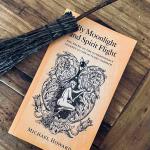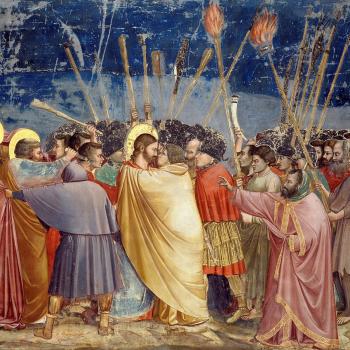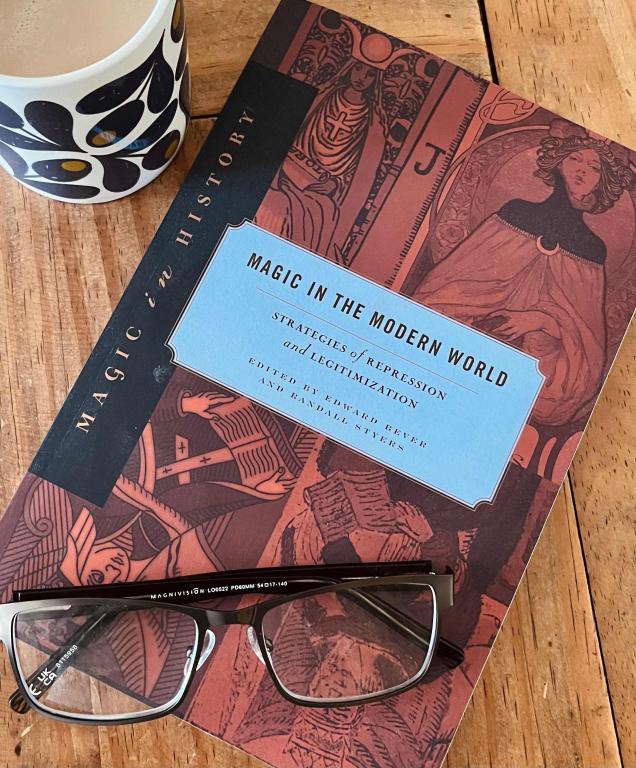
Magic in the Modern World: Strategies of Repression and Legitimization, edited by Edward Bever and Randall Styers
Magic in the Modern World is a collection of essays from leading figures and experts in the field of academic and practical study of magic, both its history and with particular reference to modernity. Brilliantly edited and collated by Edward Bever, Professor of History (State University of New York) and Randall Styers, Associated Professor of Religious Studies (University of North Carolina), these two prominent voices provide a coherent outlay to the body of work, ensuring that the underlying chain of discussion is seamlessly threaded throughout to develop the intended brief.
Edward Bever came to my attention as a leading academic expert in the field of the history of witchcraft studies and magic in modernity through his dense and thorough study of early modern witchcraft: The Realities of Witchcraft and Popular Magic in Early Modern Europe: Culture, Cognition, and Everyday Life (Palgrave-Macmillan, 2008). This exceptional insight analyses theories and experiences of witchcraft as they occurred to everyday people, reporting the actual incidences whereby individuals regarded themselves victim or cause of the magic being performed. Utilising an extensive catalogue of trial accounts, historical record, contemporary thinking, modern psychology and sociology, Bever is truly one of the best scholarly investigators and commentators upon the phenomena of modern witchcraft and magic, providing a true grasp of magic, its perception and utility.
As Bever and Styers outline in the Introduction to Magic in the Modern World, through the course of examining the place of magic in modernity a two-fold approach guides the reader both via the way in which magic and superstition have been opposed within society, and how that relates and informs the practice and technologies of magic through its continued and sustained belief and use – despite or regardless of developing psychologies and scientific opposition. In essence, the question Magic in the Modern World seeks to address is what components have informed how society at large, and cultural influences in particular, have evolved to reject magic as superstition, and yet the popularity and recourse to magical thinking not only persists but thrives.
“This volume charts a different course, exploring a complex double gesture at the heart of modernity. One set of essays examines the dynamics through which modernity has sought to expunge or repress magic… The second group of essays here examines the remarkable cultural ingenuity demonstrated by modern proponents of magic.” [1]
The approach taken by the editors, and the selection of essays, demonstrates not a rejection or biased view, but rather embraces magical thinking from a place of understanding, while acknowledging the thoughts of, say, behavioural psychologist B. F. Skinner who gave us the modern notions of ‘superstition’, defined as “…error in causal reasoning”, as Styers explains in his opening essay “Bad Habits, or How Superstition Disappeared from the Modern World”. [2]
Indeed, Bever makes some of his astute observations regarding magic within the introduction, expressing an acuity of thought that is a great benefit to modern practitioners of the magical arts. In this context, Bever appears to assert the value of magical thinking within our culture, roundly observing the benefits for both individual, and community at large:
“In its many forms, magic explicitly foregrounds questions concerning the nature of the self and its boundaries, the capacities of the will, and the relation of the self to external powers. When magic is suppressed, the self is conceived and performed largely as physically isolated and internally directed; the self is constrained into narrow modes of agency and power. When magic is embraced, the self is seen in far more expansive terms as organically interconnected with—and permeated by—various aspects of the external world; the capacities of the self are understood as participating in a broad network of material and spiritual forces. The choice between suppressing and embracing magic turns on fundamentally different understandings of the nature of the self, its boundaries, and its powers.” [3]
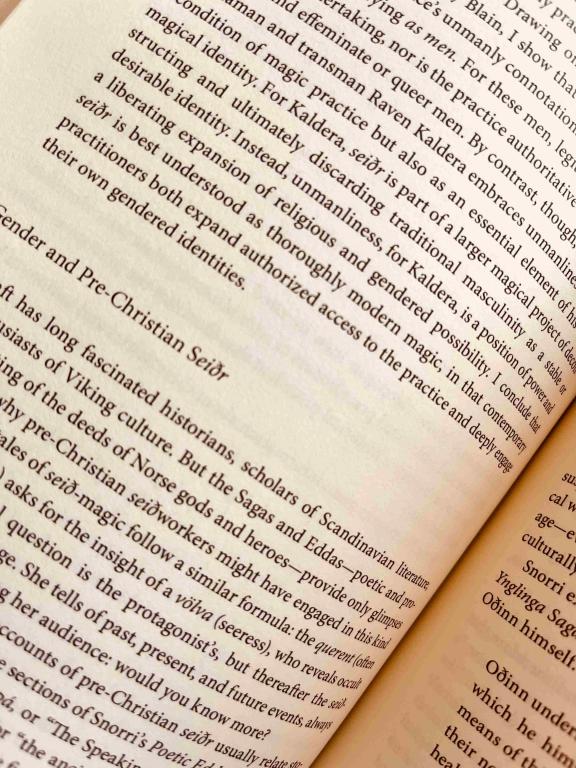
Through the course of the essays gathered in this study, the reader is not confined to the modern period, but expressly navigates the more historic forms of magic as they evolve and are made relevant today, including the Angelic system of John Dee (1527-1608), often simply called today Enochian. Egil Asprem, Professor of the History of Religions (Stockholm University), explores the development of Dee’s Enochian magic through the prism of the nineteenth and twentieth century magical revivalists, Mathers, Crowley, LaVey, and later thinkers, and the legitimising tendency of latching onto, and developing out of, historical systems of magic,
This way of thinking is then developed further through the modern fascination with premodern cultural forms of magic and belief, emerging through the lens of neopaganism. Megan Goodwin tackles the issue of revivalist paganism, especially as found within the Norse practice of seiðr, a sorcerous technique most often associated with women. This is a deeply gendered form of magic, which has seen some flourish in recent years together with the growth of interest in the Viking aesthetic – the fetishisation of a hyper-masculine ideal that rewarded psychopathic behaviours. Understanding the gendering of the historical practice is, Goodwin argues, essential for the discourse of how we place seiðr within a modern context, recognising groups that preclude male participation altogether as well as those who admit men, or work transgender. This profoundly important and apropos piece has a great deal to say that is pertinent to modern discussions surrounding gender and gender norms, identity and how we integrate a past, culturally anchored practice into a more relevant and evolved synthesis in the present community and cultural milieu.
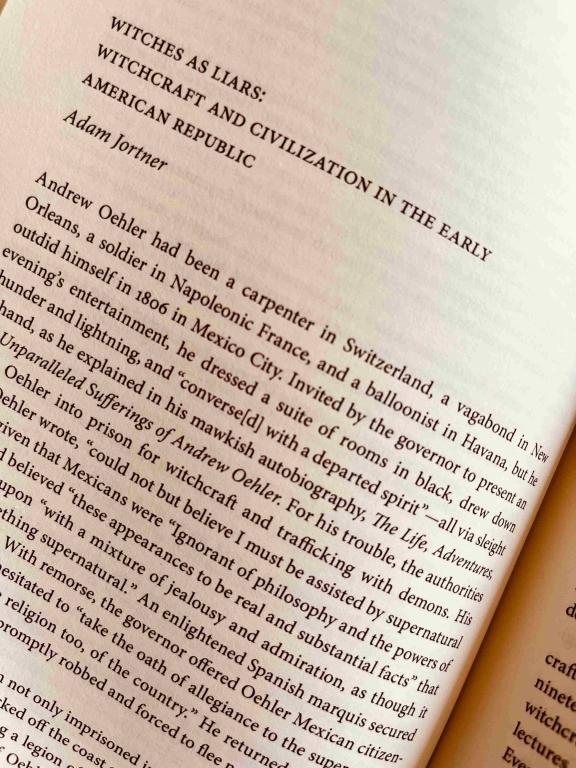
Another superb essayist, Daniel Harms, is well known within the modern magical community for his works of translation, study and publication of grimoires, most especially The Book of Oberon: A Sourcebook of Elizabethan Magic (Llewellyn Publications, 2015). In his own essay, “Reviving Dead Names: Strategies of Legitimization in the Necronomicon of Simon and the Dark Aesthetic”, Harms explores the modern grimoire The Necronomicon, a subject that has inspired the author for many years. In this, he is an expert and talks extensively upon the topic of a book first published in 1977, discussing strategies to legitimise and establish authority for the work, evoking the horror fiction of H P Lovecraft, cultural tropes and portrayals, archeology and pseudo-history, and an amalgam of religious traditions. As a postmodern cultural construct, The Necronomicon as discussed by Harms reveals a new way of approaching an old subject, through well presented arguments developed out of an agile mind.
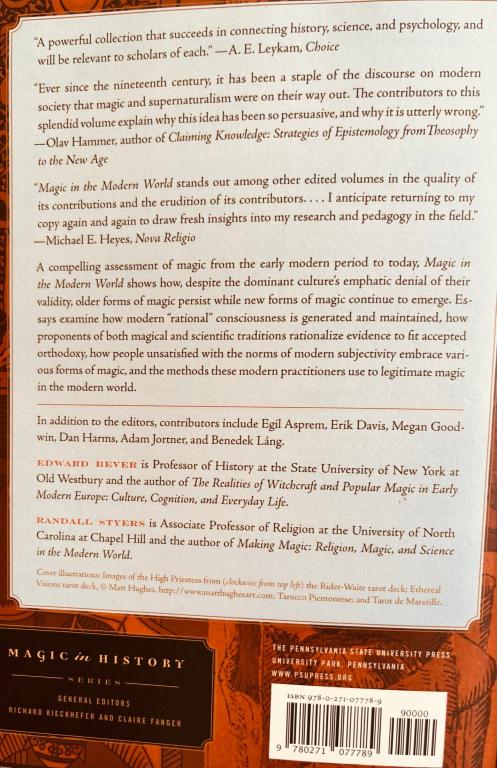
In conclusion, Magic in the Modern World provides a tantalising analysis of the development of magic, seeking legitimacy and liberation in a modern culture, all the while operating in a generalised backdrop grown somewhat hostile to magical thinking. As we live in a world of great scientific and technological advancement, it could have been assumed that magical thinking had passed its use-by-date, and been consigned to the bin of history as misplaced causal reasoning – superstition. Incredulity has become an accepted standard in regard to approaching magic and witchcraft, the default mode of most modern people. However, defying this is the trend in witchcraft and magic, propelled by social media platforms amongst the young and up-coming magical thinkers, providing a way of attending and apprehending a world grown increasingly disenchanted, disenfranchised from a way of seeing that provides essential nourishment from the imaginal and magical.
A highly recommended read for the serious student of magic and cultural studies.
Magic in the Modern World: Strategies of Repression and Legitimization was released by Penn State Press and is available through all good booksellers.
The Witch Compass: Working with the Winds in Traditional Witchcraft
The Witch Compass is Ian Chambers’ first book, published in 2022 with Llewellyn, and is available through all good booksellers. Signed copies of The Witch Compass are available from the author’s website: surrey cunning.co.uk
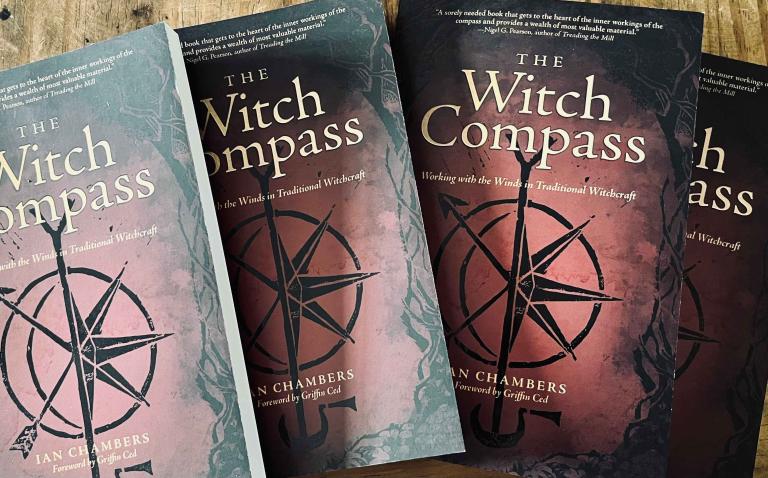
Explore the compass of the eight winds, a magical circle at the heart of Traditional Witchcraft. More than a tool for protection or raising power, this framework provides the ritual means to traverse the worlds and a mythic landscape that can be accessed at any point in time and space. Traditional Witch Ian Chambers teaches how the Witch Compass represents an entire worldview, a cosmological map, and a method for magic and revelation. He helps you develop your own compass and use it for divination, spirit work, and practical sorcery. This book shows you the world through the lens of your Witch Compass and reveals the many realms and spirits available to you.
“With this invaluable book, the aspirant unto traditional Craft and the seasoned practitioner alike are carefully guided through the workings of the compass as the map, via which the Crafter may traverse magical realities, encounter spiritual presences, and commune with ultimate Truth.” – Gemma Gary, author of Traditional Witchcraft, A Cornish Book of Ways.
“A scholarly, inspiring, and eminently informative work. I give it my highest recommendation.” – Lon Milo DuQuette, author of The Magic of Aleister Crowley.
“I found this a most fascinating and informative book, describing as it does the rationale behind the actual working of the compass, with plenty of practical demonstrations and exercises to enable the reader to experience the compass for themselves…This is a sorely needed book that gets to the heart of the inner workings of the compass and provides a wealth of most valuable material for both the beginner and more experienced practitioner alike. I congratulate Ian on producing an approachable and understandable book which will add greatly to the sum of available knowledge on a sometimes obscure and difficult subject.”―Nigel G. Pearson, author of Treading the Mill.



